CENTRAL NERVOUS SYSTEM
What is the best way to develop a smooth and exacting
technique? Which muscles should a
player concentrate on? What is the
order of sensory concentration that should follow the reading of written
music? How should fingers move and
touch the keys of a musical instrument?
How many of these questions can you answer and where do you start?
The first, most important fact to understand and admit is you are
the instrument, you are making the music; your musical instrument simply
translates what you are hearing and thinking.
What is trained when you practice and acquire knowledge is the
Central Nervous System; what plays when you perform is the Central Nervous
System, using the tools you have stored through practice. In performance, you really have no control
over what you play, except to play what you’re hearing. The performance is entirely intuitive
and subconscious, controlled by intense brain signals. Your subconscious intuition operates
20,000 times faster than your conscious thought. The reason for a fine performance is the 10,000 plus hours
that you have invested in training
the Central Nervous System. What I
would like to explain in this essay is how to go about that training task.
AMAZING FACT:
Each peripheral sense center has an assigned spot on the cerebral
cortex; the cell sequence of the spot on the cortex is an exact replica of the
cell order in the peripheral perceiving units: ‘Talk about a miracle!
This applies to visual, aural, and olfactory sensors, and fingers,
hands, feet, toes,----every conceivable peripheral sense. Two classes of sense perception exist:
Proprioceptive: sensing motion; Exteroceptive: tactile (touch) sensing.
This information is very useful when applied to practicing a
musical instrument. Finger action
is proprioceptive, with exteroceptive involved in the touch of fingers on keys. Movement of the fingers should
concentrate on the small finger muscles; large arm and shoulder muscles should
on serve as stabilizing elements.
To practice proper finger movement, the hand and fingers should be
placed directly above and touching the involved keys. The first movement will be a finger pressing only the depth
of the movement of the key. When
the next finger presses a key, the former finger lifts up as this next finger
presses down. All this should be
done slowly and with precise, authoritative movements.
When learning new fingering formations and movements, the new stimuli
would be termed neutral. As you
repeat movement, an already established ‘definite unconditional stimulus’
already established is used to complete the reflex. As you repeat the movement numerous times, the new stimulus
and the old established stimulus achieve the reflex together, and eventually,
the new stimulus produces the reflex alone. This process of learning is always the same for motion
related stimuli.
Results will be most successful when the movements are performed
slowly, with each repetition as precise as possible.
The intensity of your concentration and your basic health and well
being also have a direct effect on training your central nervous system.
The previous reflex conditioning is categorized as a ‘First
Signaling System’, stimuli such as impressions and sensations from the outside
world and muscular movements.
Verbal and sight stimuli belong to the category of ‘Second
Signaling System’.
Written musical notation, like verbal stimuli, becomes signals, in
this case for sound. The written
note first excites the visual region of the cortex, and is then transferred to
the auditory region, which provokes the corresponding motor response.
When playing from memory, the auditory region becomes
physiologically connected directly to the motor region (through numerous times
of practice), and the written notation (visual region of cortex) is no longer
needed.
This will start your awareness of the importance of your central
nervous system and how it is what you are training as you practice a musical
instrument.
Keep checking this Essay for updates, as I will constantly be
adding information as I learn more about the brain.
Please give me comments and feedback.
I hope this study helps you, for it surely excites me.
Sincerely,
Errol Weiss Schlabach



















































